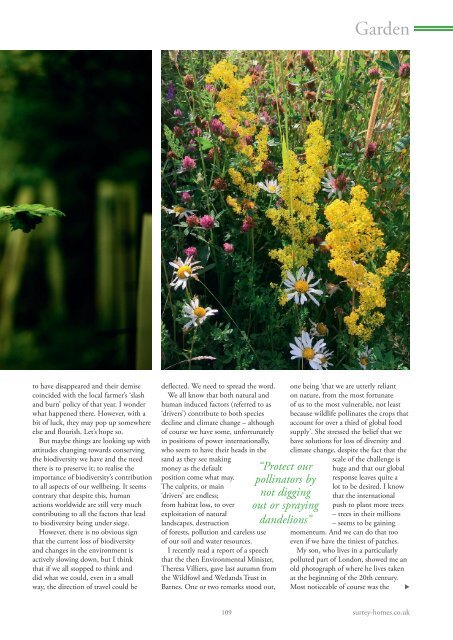Surrey Homes | SH65 | March 2020 | Good Living supplement inside
The lifestyle magazine for Surrey - Inspirational Interiors, Fabulous Fashion, Delicious Dishes
The lifestyle magazine for Surrey - Inspirational Interiors, Fabulous Fashion, Delicious Dishes
Create successful ePaper yourself
Turn your PDF publications into a flip-book with our unique Google optimized e-Paper software.
Garden<br />
to have disappeared and their demise<br />
coincided with the local farmer’s ‘slash<br />
and burn’ policy of that year. I wonder<br />
what happened there. However, with a<br />
bit of luck, they may pop up somewhere<br />
else and flourish. Let’s hope so.<br />
But maybe things are looking up with<br />
attitudes changing towards conserving<br />
the biodiversity we have and the need<br />
there is to preserve it; to realise the<br />
importance of biodiversity’s contribution<br />
to all aspects of our wellbeing. It seems<br />
contrary that despite this, human<br />
actions worldwide are still very much<br />
contributing to all the factors that lead<br />
to biodiversity being under siege.<br />
However, there is no obvious sign<br />
that the current loss of biodiversity<br />
and changes in the environment is<br />
actively slowing down, but I think<br />
that if we all stopped to think and<br />
did what we could, even in a small<br />
way, the direction of travel could be<br />
deflected. We need to spread the word.<br />
We all know that both natural and<br />
human induced factors (referred to as<br />
‘drivers’) contribute to both species<br />
decline and climate change – although<br />
of course we have some, unfortunately<br />
in positions of power internationally,<br />
who seem to have their heads in the<br />
sand as they see making<br />
money as the default<br />
position come what may.<br />
The culprits, or main<br />
‘drivers’ are endless;<br />
from habitat loss, to over<br />
exploitation of natural<br />
landscapes, destruction<br />
of forests, pollution and careless use<br />
of our soil and water resources.<br />
I recently read a report of a speech<br />
that the then Environmental Minister,<br />
Theresa Villiers, gave last autumn from<br />
the Wildfowl and Wetlands Trust in<br />
Barnes. One or two remarks stood out,<br />
“Protect our<br />
pollinators by<br />
not digging<br />
out or spraying<br />
dandelions”<br />
one being ‘that we are utterly reliant<br />
on nature, from the most fortunate<br />
of us to the most vulnerable, not least<br />
because wildlife pollinates the crops that<br />
account for over a third of global food<br />
supply’. She stressed the belief that we<br />
have solutions for loss of diversity and<br />
climate change, despite the fact that the<br />
scale of the challenge is<br />
huge and that our global<br />
response leaves quite a<br />
lot to be desired. I know<br />
that the international<br />
push to plant more trees<br />
– trees in their millions<br />
– seems to be gaining<br />
momentum. And we can do that too<br />
even if we have the tiniest of patches.<br />
My son, who lives in a particularly<br />
polluted part of London, showed me an<br />
old photograph of where he lives taken<br />
at the beginning of the 20th century.<br />
Most noticeable of course was the<br />
<br />
109 surrey-homes.co.uk


















